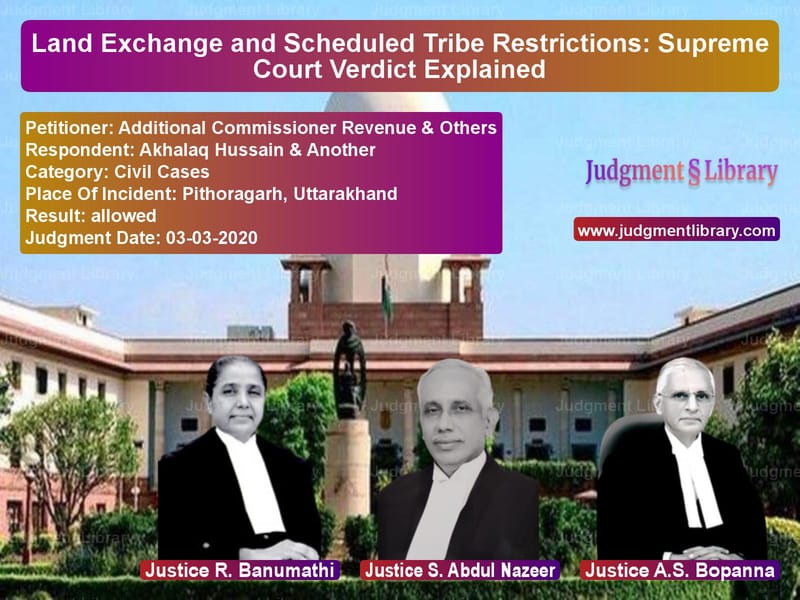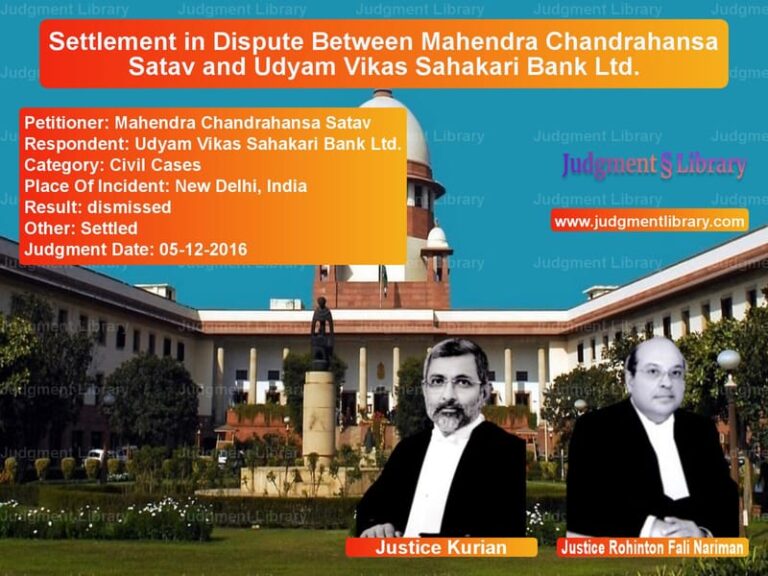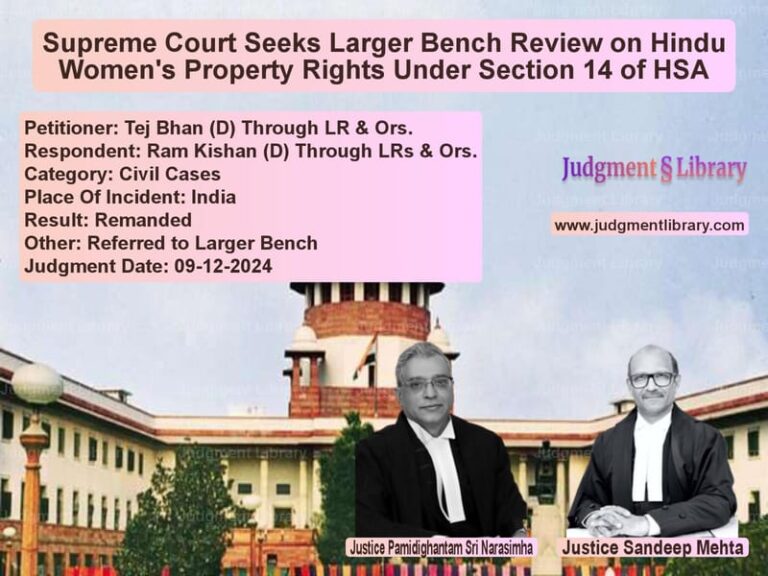Land Exchange and Scheduled Tribe Restrictions: Supreme Court Verdict Explained
The Supreme Court of India, in its ruling on Additional Commissioner Revenue & Others v. Akhalaq Hussain & Another, examined the legality of land exchange between a Scheduled Tribe member and a non-Scheduled Tribe individual under the U.P. Zamindari Abolition and Land Reforms Act, 1950. The Court addressed key legal questions regarding the application of Sections 157-B and 161 of the Act and ruled that the exchange was void.
The dispute originated when Akhalaq Hussain and Saqir Hussain entered into an exchange agreement with Mangal Singh, a Scheduled Tribe member. The respondents transferred 4.5 Muthi (56.25 square meters) of land in exchange for 12 Nali (2400 square meters) of agricultural land in Pithoragarh. Subsequently, the revenue authorities declared the exchange illegal due to its violation of statutory provisions. The matter escalated through various judicial levels before reaching the Supreme Court.
Background of the Case
Land ownership and transfer in India are governed by various laws designed to protect marginalized communities, including Scheduled Tribes. The U.P. Zamindari Abolition and Land Reforms Act (U.P. ZA & LR Act) imposes restrictions on land transactions involving Scheduled Tribe members. Under Section 157-B, land owned by a Scheduled Tribe member cannot be transferred to a non-Scheduled Tribe individual.
In this case, the respondents constructed a hotel on the exchanged land and claimed rightful ownership. The government, however, intervened, stating that the exchange violated statutory provisions, and ordered the vesting of the land in the State Government. This order led to a series of legal battles, culminating in the Supreme Court’s decision.
Arguments Presented by the Petitioners
The Additional Commissioner Revenue and other appellants challenged the High Court’s decision, arguing that it misinterpreted the U.P. ZA & LR Act. They presented the following key points:
- Section 157-B strictly prohibits the transfer of land by a Scheduled Tribe member to a non-Scheduled Tribe individual, including through exchange.
- Section 161 mandates prior permission from the Assistant Collector for land exchange, which was not obtained in this case.
- The High Court erred by setting aside the findings of the Assistant Collector and revenue authorities, thereby exceeding its jurisdiction under Article 227 of the Constitution.
- The exchange was not a genuine land swap but a disguised sale, given the disproportionate land sizes involved.
Arguments by the Respondents
The respondents defended their land exchange, arguing that:
- The land exchanged was not agricultural and therefore not subject to the restrictions of the U.P. ZA & LR Act.
- Failure to obtain prior permission under Section 161 does not automatically void the exchange.
- The mutation of land records and subsequent hotel construction indicated that the authorities had tacitly accepted the transaction.
- The High Court was justified in ruling that an exchange under a duly registered document was valid despite objections from the authorities.
Supreme Court’s Observations
The Supreme Court examined the core issues and emphasized that land transactions involving Scheduled Tribe members must strictly adhere to statutory requirements. It observed:
“Since the exchange deed has been executed in violation of the provisions of Section 157-B of the Act, the transfer is void and is liable to be set aside.”
The Court further ruled that:
- Land transactions, including exchanges, must conform to Section 157-B, which explicitly bars transfers to non-Scheduled Tribe individuals.
- Section 161 requires prior permission for exchanges, and the absence of such approval renders the transaction invalid.
- Declarations under Sections 143 and 144 are necessary to change the land’s classification from agricultural to non-agricultural.
- The disproportionate exchange (56.25 square meters for 2400 square meters) raised concerns about the transaction’s legitimacy.
Legal Precedents Considered
The Supreme Court cited previous rulings, including:
- Chandrika Singh v. Raja Vishwanath Pratap Singh (1992) 3 SCC 90, which emphasized that land use changes require statutory approval.
- Samatha v. State of A.P. (1997) 8 SCC 191, which highlighted the importance of land ownership protection for Scheduled Tribes.
- Waman Rao v. Union of India (1981) 2 SCC 362, which discussed the socio-economic implications of land rights.
Conclusion and Implications
The Supreme Court’s ruling reaffirms the stringent legal safeguards surrounding land transactions involving Scheduled Tribes. The decision highlights that:
- All land exchanges involving Scheduled Tribe members must adhere to statutory provisions.
- Failure to obtain necessary permissions renders transactions void, irrespective of subsequent developments.
- Beneficial legislation like the U.P. ZA & LR Act must be interpreted in a manner that upholds its protective objectives.
By reinforcing these principles, the judgment sets a clear precedent for future land disputes involving similar legal issues.
Petitioner Name: Additional Commissioner Revenue & Others.Respondent Name: Akhalaq Hussain & Another.Judgment By: Justice R. Banumathi, Justice S. Abdul Nazeer, Justice A.S. Bopanna.Place Of Incident: Pithoragarh, Uttarakhand.Judgment Date: 03-03-2020.
Don’t miss out on the full details! Download the complete judgment in PDF format below and gain valuable insights instantly!
Download Judgment: Additional Commissio vs Akhalaq Hussain & An Supreme Court of India Judgment Dated 03-03-2020.pdf
Direct Downlaod Judgment: Direct downlaod this Judgment
See all petitions in Property Disputes
See all petitions in Landlord-Tenant Disputes
See all petitions in Contract Disputes
See all petitions in Judgment by R. Banumathi
See all petitions in Judgment by S. Abdul Nazeer
See all petitions in Judgment by A. S. Bopanna
See all petitions in allowed
See all petitions in supreme court of India judgments March 2020
See all petitions in 2020 judgments
See all posts in Civil Cases Category
See all allowed petitions in Civil Cases Category
See all Dismissed petitions in Civil Cases Category
See all partially allowed petitions in Civil Cases Category







